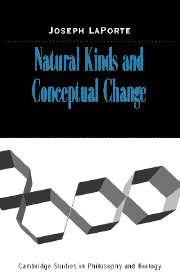Book contents
- Frontmatter
- Contents
- Preface
- Introduction
- 1 What Is a Natural Kind, and Do Biological Taxa Qualify?
- 2 Natural Kinds, Rigidity, and Essence
- 3 Biological Kind Term Reference and the Discovery of Essence
- 4 Chemical Kind Term Reference and the Discovery of Essence
- 5 Linguistic Change and Incommensurability
- 6 Meaning Change, Theory Change, and Analyticity
- Notes
- References
- Index
3 - Biological Kind Term Reference and the Discovery of Essence
Published online by Cambridge University Press: 10 December 2009
- Frontmatter
- Contents
- Preface
- Introduction
- 1 What Is a Natural Kind, and Do Biological Taxa Qualify?
- 2 Natural Kinds, Rigidity, and Essence
- 3 Biological Kind Term Reference and the Discovery of Essence
- 4 Chemical Kind Term Reference and the Discovery of Essence
- 5 Linguistic Change and Incommensurability
- 6 Meaning Change, Theory Change, and Analyticity
- Notes
- References
- Index
Summary
According to the received wisdom, scientists inquire into the nature of kinds that were named before much science was known. When all goes well, scientists discover the essences of the kinds in question. Scientists' conclusions about essences are discoveries, not stipulations. When scientists have discovered enough about the essence of a kind, they can correct past speakers who supposed that certain objects did or did not have what it takes to belong to the kind.
The foregoing picture is not initially implausible. Consider scientists' study of the rodents. Any schoolchild acquainted with the animals traditionally counted rodents could confirm the striking morphological and behavioral similarities between these animals. Nevertheless, many scientists now claim that some so-called “rodents” are impostors. Teams of scientists have presented molecular data over the past several years in support of the conclusion that guinea pigs, long counted rodents, have an evolutionary history that excludes them from the rodent camp.
Supposing that these scientists' empirical information about evolutionary relationships is solid, scientists would appear to have discovered that guinea pigs are not rodents. That guinea pigs are not rodents would appear to be an empirically discovered necessary truth. In the same way, our claim that whales are not fish appears to have been discovered to be true. Scientists appear to have corrected past speakers who said otherwise. Empirical research has resulted in scientists' “discovering that ‘whales are mammals, not fish’ is a necessary truth” (Kripke 1980, p. 138).
- Type
- Chapter
- Information
- Natural Kinds and Conceptual Change , pp. 63 - 91Publisher: Cambridge University PressPrint publication year: 2003



